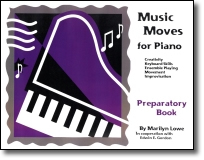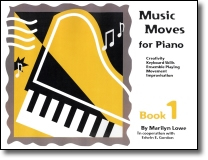|
About the Curriculum
We use a stimulating, revolutionary approach to piano instruction that is based on extensive research about how children
best learn music, called "Music Moves for Piano". Students are given an opportunity to acquire the language of music in a
way that encourages independent music making and musical thinking.
With emphasis on music as both an aural (listening)
art and an oral (performing) art, our program develops the entire musician while students sing, chant, and move to music they
will learn to play.
A solfege (syllable) system helps students organize the sounds they know and is key to a successful
transition to reading notation. When students are ready to read, they are able to bring meaning to what they see on the page.
Incorporated into this instruction is a wise and systematic presentation of purely pianistic skills (keyboard knowledge,
technique and body awareness) using an attractive and musically rich repertoire of folk and original compositions.
Creativity
and improvisation are part of each lesson from the very beginning. Students in our program are given an opportunity
to take advantage of the benefits of a peer group setting.
Students who have used this series show high retention, secure performance skills, solid reading and writing skills, music
creativity, and development of audiation skills (the ability to think musically with understanding). Many are able to easily
create arrangements of songs, transpose and harmonize songs, improvise, compose original music, or play music for parties.
Lesson activities are organized around four specific areas of musical development: 1) audiation skills (ability to
think musically with understanding) using singing, chanting, moving, and pattern instruction; 2) keyboard geography and technique;
3) keyboard exploration, creativity, and improvisation; 4) book/listening assignments.
Students engage in movement
and sing songs that will later be performed. They also chant and sing tonal and rhythmic patterns, and learn to play
piano pieces, initially without using notation.
Q & A about Music Moves for Piano
Q - Is your program like the Suzuki program?
A
- There are similarities. We both believe that children learn best through listening rather than the printed page, emphasize
the importance of positive early music experiences, make comparisons to language development, and incorporate both group and
private instruction.
However, the Suzuki program encourages children to learn to imitate, whereas our program encourages
children to go one step further and learn to audiate. As a result, our program emphasizes creativity and pattern instruction
in addition to its sequential repertoire.
Both methods use carefully chosen and properly sequenced literature; however,
MUSIC MOVES uses shorter pieces and a more diverse collection of tonalities and meters. In practice, Suzuki students are asked
to listen to an entire lengthy "paragraph" of music and then to play it. MUSIC MOVES students are asked to listen to and understand
a few "words" in a much shorter "paragraph." Those musical "words" (or patterns) are recognized in the many short pieces the
students learn to play.
Q - What exactly is audiation?
A - Audiation
is the ability to think musically with understanding, to be able to hear musical sounds even if there is no music present,
to be able to sense when and what to sing or play.
Audiation contrasts with imitation because it involves learning
through one's own ears rather than someone else's ears.
Q - When and how do the children learn to read notation?
A - Just as in
language development, children learn to read when they are ready. Some children pick it up quickly without much teacher assistance.
Others need more time and assistance.
In our approach to music literacy, the use of pattern instruction and associating
syllables with the patterns is key to the transition to reading notation. Students much more easily associate symbols on the
page with patterns they have sung, moved to, and understand in their heads. Moreover, the ability to give meaning to notes,
phrases and styles is preferable to just reading note names and finding the right keys.
Q
- What if my child needs to change teachers at some point? Will the transition to a traditional method be difficult?
A
- Students can transition very easily to a traditional method. Any perceptive piano teacher will recognize that your child
has inner musical skills, which are the foundation for good piano playing.
Q - How can we help our children practice?
A - You can best help practice
by recognizing that a regular time each day helps build a good practice habit. The earlier in the day, the easier it is for
practice to occur. Try to find ways to reward your child externally for practice. At lessons, we reward with stickers. At
home, look for other ways to encourage your child. Remember, praise is always the most coveted reward.
In addition,
help your young child deal with practice time by focusing on repetition rather than a specific amount of required time at
the piano. Playing each piece three times or three different ways is less overwhelming than practicing for 30 minutes.
Remember
that listening to the CDs and creating pieces at home should be a regular part of practice time along with creating a piece
each day.
Q - Can my child start piano lessons before we have a piano at home? What about
digital or electronic keyboards?
A - Students do need some type of keyboard or acoustic piano for Piano
Lessons. A good acoustical piano is preferable, however, digital pianos are acceptable. Some digital pianos are preferable
to inexpensive, neglected acoustical pianos of questionable quality.
If you plan to purchase a digital keyboard, please
consider a full size keyboard and request that the action simulate an acoustical piano. The Yamaha and Roland (my favourite) digital
keyboards have the best reputations. Yamaha digital pianos can be seen at Tom Lee Music (Barnet Hyw. near Eagle Ridge Movie
Theatres). For information about Roland digital pianos,check out http://www.creativ.com . Creativ is located in North Vancouver, and has a rent-to-own plan.
Thanks to the wonderful folks at Music Moves for Children for allowing me
to reprint the above information. Please visit their website:
Music Moves for Children
|
|
|
|
 |
|
The Benefits of Group Lessons
At Creative Keys Music Academy, we strive to provide the very best in music education. That is why we offer group lessons.
We believe that children learn very well in a group setting.
We'd like to take this opportunity to outline some of
the benefits of group lessons:
1. Children learn faster in group lessons.
When children learn along
side their peers, they are more motivated to practice, and quickly develop an independance which just doesn't happen in private
lessons.
2. Group lessons are more fun!
Because they are learning in a small group setting, students
have the opportunity to interact with other kids. In private lessons, the child's only interaction is with the teacher.
3.
Better value for you money.
All beginner students in group lessons receive approximately 4 hours of instruction
a month. Beginner students in private lessons only receive 2 hours/month.
4. Group lessons encourage musical playing.
In group lessons, children have the opportunity to listen
to other children's interpretation of the same songs. The positive peer pressure encourages well-prepared, musical performances
of pieces.
5. Group lessons build strong performance skills.
Because children are playing/ performing
for their "music friends" every week, they get used to performing in a small group setting. When it's time to make the transition
to formal recitals, the students have already had plenty of performance experience.
6. Group lessons build strong
technique.
One of the biggests myths about group piano lessons is that children don't develop good technique. This
is not true! In a private lesson, a student is taught how to fix their specific technical challenges. In a group lesson, each
student will have different technical challenges. Students listen to the advice of the teacher for a variety of different
challenges.
7. Ensemble Playing.
Students who play in a group setting develop a stronger sense of rhythm
and better confidence when playing with others. Not only does this encourage team work, but it is also great experience if
the child later goes on to play in a concert band or orchestra setting.
8. Games.
This one always catches
the kids attention! In a private, half-hour lesson, there is simply not enough time to play fun games that reinforce the concepts
being taught. Because group lessons are longer (usually 50-60 minutes long), there is more time to play fun games!
9.
Group lesson time is more valuable than a private lesson!
How can this be? Well, when a student who hasn't practice
all week shows up for a private lesson, there is not much that can be done; usually, the time is used playing scales or doing
theory work (rather boring for a child!) In group lessons, when a child comes unprepared, they still have the opportunity
to observe the learning process. Also, in group lesson, the teacher isn't the only person the students learn from - students
learn from each other!
10. Group Lessons are fun!
Students enjoy preparing for, and coming to, piano lessons each week because the group lesson setting is so much fun!!
As you can see, there are numerous benefits to group lessons. At Creative Keys Music Academy, children taking group
lessons learn on a full-sized acoustic piano. The majority of group piano teachers in the Tri-Cities area teach on inexpensive
electronic keyboards, which do not offer properly weighted keys.
We believe that learning to play the piano should
not be a chore! When music lessons are fun, more learning takes place! What better way to have fun than learning with your
friends


Would you like more information about Music Moves for Piano group lessons? Please fill out the following
form:
|
|
|
|




